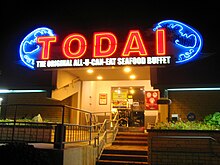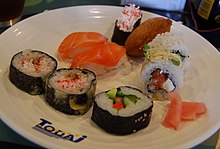
Sushi is a Japanese dish of prepared vinegared rice, usually with some sugar and salt, plus a variety of ingredients, such as vegetables, and any meat, but most commonly seafood. Styles of sushi and its presentation vary widely, but the one key ingredient is "sushi rice", also referred to as shari (しゃり), or sumeshi (酢飯).

The cuisine of California reflects the diverse culture of California and is influenced largely by European American, Hispanic American, East Asian and Oceanian influences, and Western European influences, as well as the food trends and traditions of larger American cuisine.

A buffet can be either a sideboard or a system of serving meals in which food is placed in a public area where the diners serve themselves. A form of service à la française, buffets are offered at various places including hotels, restaurants, and many social events. Buffet restaurants normally offer all-you-can-eat food for a set price, but some measure prices by weight or by number of dishes. Buffets usually have some or mostly hot dishes, so the term cold buffet has been developed to describe formats lacking hot food. Hot or cold buffets usually involve dishware and utensils, but a finger buffet is an array of foods that are designed to be small and easily consumed only by hand, such as cupcakes, slices of pizza, foods on cocktail sticks, etc.
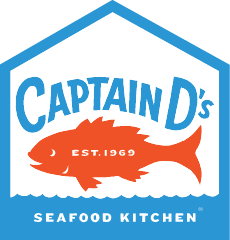
Captain Ds, LLC. is an American fast casual restaurant chain that specializes in seafood and is headquartered in Nashville, Tennessee. The chain was founded as Mr. D's Seafood and Hamburgers by Raymond L. Danner Sr. on August 15, 1969, in Donelson, Tennessee. The chain is currently owned by private-equity firm Centre Partners. Captain D's has more than 500 locations in the United States.
VitaNova Brands, based in San Antonio, Texas, was an operator of a number of American national buffet chain restaurants including subsidiary company Furr's.
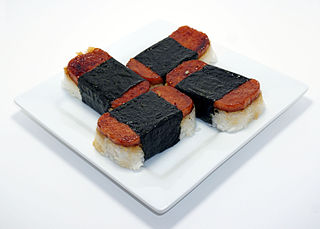
Spam musubi is a snack and lunch food composed of a slice of grilled Spam sandwiched either in between or on top of a block of rice, wrapped together with nori in the tradition of Japanese onigiri.

Mitsuwa Marketplace is a Japanese supermarket chain in America, with locations in California, Illinois, Texas, Hawaii, and New Jersey.

Poke is a dish of diced raw fish tossed in sauce and served either as an appetizer or a main course.
YO! Sushi is a chain of conveyor belt sushi restaurants, principally in the United Kingdom, Republic of Ireland, United Arab Emirates, Saudi Arabia, Bahrain, Kuwait and Australia.
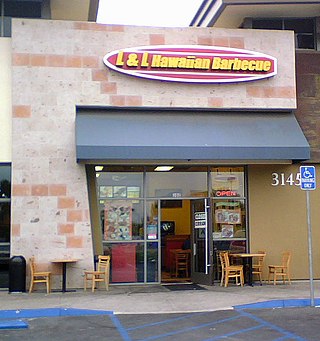
L&L Hawaiian Barbecue, known also as L&L Drive-Inn or colloquially as L&L, is a Hawaii-themed franchise restaurant chain based in Honolulu, Hawaii, centered on the plate lunch.
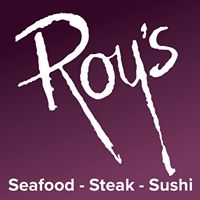
Roy's is an upscale American restaurant that specializes in Hawaiian and Japanese fusion cuisine, with a focus on sushi, seafood and steak. The chain was founded by James Beard Foundation Award Winner Roy Yamaguchi in 1988 in Honolulu, Hawaii. The concept was well received among critics upon inception. The concept has grown to include 21 Roy's restaurants in the continental United States, six in Hawaii, one in Japan and one in Guam.
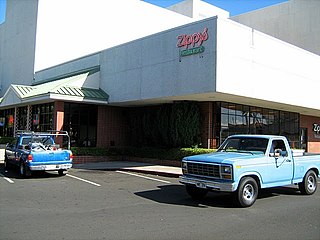
Zippy's is a fast casual restaurant chain based in Hawaii. It has 22 locations and serves American, Japanese, Chinese, and Hawaiian fusion food. One of their best-selling items is chili.
Ashley (Korean: 애슐리), is a restaurant chain based in South Korea owned by the E-Land. As of 2014, the chain had over 140 retail stores in South Korea. Ashley is a buffet which specializes in beef and steak.

Wasabi is a fast food restaurant chain based in the United Kingdom, focused on Japanese, East Asian-inspired fast food, especially sushi and bento, and operating primarily in London, England, with further branches elsewhere in England as of 2022. Wasabi was founded in London in 2003 by Dong Hyun Kim, a South Korean entrepreneur. In November 2019, Henry Birts joined as CEO.

Katsu Burger is a Japanese-themed burger restaurant chain in the Seattle metropolitan area, in the U.S. state of Washington.

Gen Korean BBQ is an American chain of all-you-can-eat Korean barbecue restaurants mainly concentrated around the Western U.S. It opened in 2011, and has since grown to 36 locations as of 2024.

The Boiling Crab is an American restaurant chain serving food from Cajun cuisine. Founded in 2004, the chain has 30 restaurants, mainly centering them in the Southwestern United States, although it has some international locations and others outside of the area.
